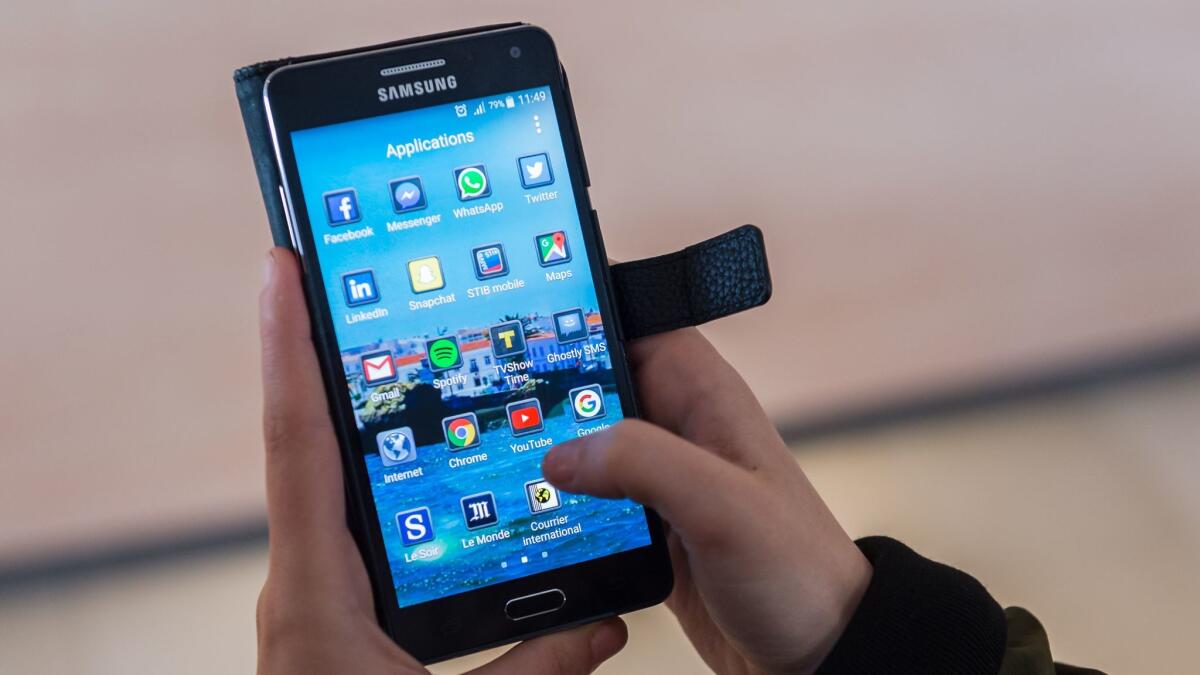Op-Ed: I’m not ‘addicted’ to my smartphone. I depend on it to survive

- Share via
It has become commonplace to the point of cliché for pundits to explain in worried tones that smartphones can be addictive.
In a recent “60 Minutes” segment, Anderson Cooper interviewed Tristan Harris, a former product manager at Google, who compared smartphones to slot machines because both have a built-in reward system that we find hard to resist — the thrill of pulling a lever and making money versus pushing a button and getting a notification. Cooper suggested that tech companies, by getting us hooked on mobile apps, are “hijacking” our brains.
This argument seems inarguably correct to those who’ve seen comScore reports suggesting that Americans spend more than 70 hours a month on average using smartphone apps, and that the number is growing each year. But lost in the narrative that we’ve become too “dependent” on smartphones — a word that pops up all the time in addiction punditry — is that not all usage is frivolous, or even strictly voluntary. Like many disabled people, I depend on my phone for survival.
At 28, I have been bedridden for more than two years with a severe case of myalgic encephalomyelitis (or chronic fatigue syndrome), a multi-system disease that severely impairs the body’s metabolic features, and has left me unable to speak, eat solid food or properly hydrate my body for months at a time.
The whole concept of smartphone addiction, or an unhealthy reliance on any technology, is unfair when applied indiscriminately to the population as a whole.
For the last year and a half I have relied on a paid caregiver to help me get through each day. She arrives early in the morning and clocks in using a timekeeping app on my smartphone. Because my speech is limited, I type out instructions for her to read or I have my smartphone read them to her using the device’s speech function. This continues throughout my caregiver’s seven-hour shift as I use various templates saved on my phone: “Please fill my water glass” or “I would like to brush my teeth.”
Besides providing food and water, my caregiver also helps me bathe, changes my sheets, brings me new clothes to wear, and even empties and cleans my bedside “bathroom,” all of which I prompt using my smartphone.
This type of communication with my caregiver is especially important on days when my routine has been altered. Occasionally my medications change and I use my phone to tell her how to properly administer the new regimen.
It is not uncommon for something to go wrong. When I woke up the other day, my house was empty: My caregiver hadn’t shown up for work. I felt absolutely terrified as I realized I had no way to eat or drink. After a few minutes of sheer panic, I grabbed my smartphone to notify a family member via text message. Within two hours I had someone at my house to help me. Without a smartphone I would have remained alone, hungry and afraid, until someone happened to come check on me.
My smartphone is also the main way I communicate with my doctors and nurses. I frequently send them emails and text messages with updates about my blood pressure, heart rate, and other vital health metrics I track using various apps. Beyond health care, I use my smartphone to buy food online, as I’m unable to drive to the grocery store.
People with disabilities such as mine aren’t the only ones who rely heavily on smartphones for reasons that have nothing to do with addiction. Some people, particularly those in lower income households, simply cannot afford high-speed internet access beyond their smartphone’s data plan. In fact, according to the Pew Research Center, 10% of all Americans have no other source of high-speed internet in their home other than their smartphone.
Refugees separated by war use their smartphones to keep in contact with family and access the Internet to read news relevant to their situation or tell their story on social media.
And of course there are many people who have little choice but to use their smartphones all day because their employers expect constant contact.
The whole concept of smartphone addiction, or an unhealthy reliance on any technology, is unfair when applied indiscriminately to the population as a whole. It reeks of luxury and entitlement and ignorance of the basic fact that smartphones are just a portal — some people use that portal to obsessively check Twitter, sure, but others use it for basic necessities. I use my smartphone constantly not to get my fix, but to stay alive.
Jamison Hill is a writer currently working on a memoir based on his blog, Jamison Writes, which covers his experiences with chronic illness.
Follow the Opinion section on Twitter @latimesopinion or Facebook
More to Read
A cure for the common opinion
Get thought-provoking perspectives with our weekly newsletter.
You may occasionally receive promotional content from the Los Angeles Times.









